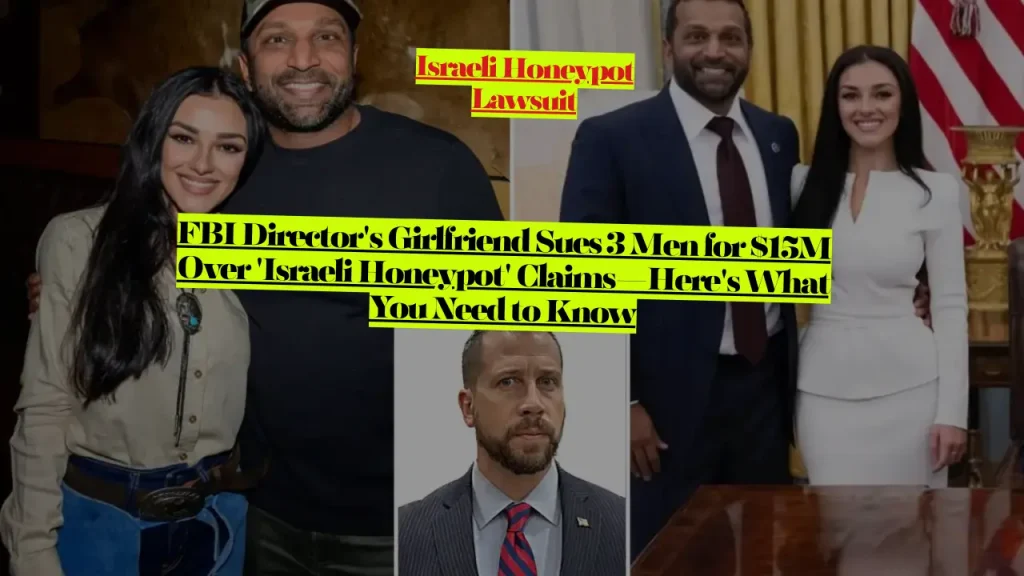Israeli Honeypot Lawsuit, FBI Director’s Girlfriend Alexis Wilkins Sues 3 Men for $15M Over ‘Israeli Honeypot’ Claims
What’s Happening Right Now
Alexis Wilkins, the 26-year-old country singer dating FBI Director Kash Patel, has filed three separate $5 million defamation lawsuits—totaling $15 million—against conservative influencers who claimed she’s an Israeli intelligence agent working as a “honeypot” to manipulate Patel.
Here’s What You Need to Know:
- Who’s Being Sued: Kyle Seraphin (former FBI agent and podcaster), Sam Parker (failed Utah Senate candidate), and Elijah Schaffer (conservative influencer)
- The Allegation: All three men publicly claimed Wilkins is a Mossad agent in a romantic relationship with Patel to compromise the FBI director
- The Claim: Each lawsuit demands $5 million for spreading what Wilkins calls “malicious and knowing lies”
- Timeline: First lawsuit filed August 2025 against Seraphin; Parker and Schaffer suits followed in November 2025
- Current Status: All three defendants have been served; jury trials demanded in all cases
The allegations emerged after online conspiracy theories questioned Wilkins’ relationship with Patel, suggesting she was part of a foreign intelligence operation. The lawsuits state she’s never even been to Israel and was born and raised in Arkansas.
The “Honeypot” Conspiracy That Started It All
In intelligence operations, a “honeypot” is when someone uses romance or attraction to get close to a target and extract sensitive information. Think of it like a spy movie where an attractive person seduces someone with security clearance to steal secrets.
The conspiracy theory about Wilkins started circulating on social media after Patel became FBI Director in February 2025. Critics questioned why a 26-year-old country singer would date a 45-year-old government official, with some suggesting she was planted by Israeli intelligence.

What the Defendants Said:
Kyle Seraphin claimed on his podcast that Patel has “his own little ‘honeypot’ issue,” suggesting Wilkins is an agent assigned to manipulate the FBI director.
Sam Parker posted a lengthy thread questioning whether Wilkins’ “meteoric rise” was “organic” and discussed her work for PragerU, calling it “an operation of Israeli intelligence”.
Elijah Schaffer spread claims that Wilkins is “an agent of foreign government, assigned to manipulate and compromise the Director of the FBI”.
Wilkins’ Response: The lawsuits state these allegations are categorically false. She’s an American-born country singer, podcast host, and conservative political commentator with over 90,000 Instagram followers. She and Patel have been dating for three years, starting their relationship in early 2023—more than a year before he became FBI Director.
Why This Defamation Case Is Different (And Harder to Win)
Most defamation lawsuits are straightforward: prove someone lied about you and harmed your reputation. But Wilkins faces a significant legal hurdle because she’s likely considered a “public figure.”
What Makes Someone a Public Figure? Courts classify people as public or private figures based on their prominence and influence. Wilkins appears to qualify as at least a “limited-purpose public figure” because she:
- Has 90,000+ social media followers
- Performs at conservative political events
- Works as a PragerU media personality
- Is dating the FBI Director
Why This Matters: Public figures must prove “actual malice”—the highest legal standard in defamation cases. This means Wilkins must show the defendants either:
- Knew their statements were false when they made them, OR
- Had serious doubts about the truth but published anyway
Private citizens only need to prove negligence (basically, that the person didn’t fact-check). Public figures need to prove intentional lies or reckless disregard for truth.
This standard comes from the 1964 Supreme Court case New York Times v. Sullivan, which made it harder for public figures to sue to protect freedom of speech and public debate. The reasoning? Public figures have platforms to defend themselves and should expect scrutiny.
What Could Help Wilkins Win:
- Defendants allegedly used these claims as “clickbait” to raise money
- Claims are easily verifiable as false (she’s never been to Israel, not Jewish, relationship predates FBI appointment)
- Defendants may have known the claims were baseless but published anyway
- Pattern of repeated false statements despite no evidence
Similar high-profile defamation cases show mixed results. When public figures pursue defamation claims, they often settle rather than go to trial because proving actual malice is difficult.
The $15 Million Question: What Damages Is Wilkins Seeking?
Each lawsuit demands $5 million in “compensatory, special, and punitive damages.” Let’s break down what that means:
Compensatory Damages: Money to compensate for actual harm, including:
- Damage to her country music career and brand partnerships
- Lost income from canceled performances or endorsements
- Emotional distress from death threats and harassment
- Cost of reputation repair
Special Damages: Specific financial losses with receipts, like:
- Proven lost contracts or business opportunities
- Security costs (FBI provided protection due to hundreds of death threats)
- Legal fees and investigation expenses
Punitive Damages: Extra money meant to punish defendants and deter others from similar conduct. These require proving actual malice—the same standard needed to win the defamation claim itself.
Reality Check on the $15 Million: Defamation settlements rarely reach claimed amounts. Most settle for far less, often in the range of $50,000 to $500,000 depending on actual documented harm. However, the high dollar figure serves strategic purposes:
- Sends a strong message about seriousness
- Creates leverage for settlement negotiations
- Signals defendants profited from the false claims
Understanding how damages work in personal injury and defamation cases helps clarify what Wilkins might realistically recover.
Related Lawsuit: Manny Khoshbin Lawsuit, Billionaire Car Collector Scammed Out of $3.4M in Mercedes-AMG One Fraud

Political Firestorm: Why This Case Sparked Conservative Backlash
The lawsuits haven’t just created legal drama—they’ve ignited a political firestorm within conservative circles.
The Criticism: Conservative influencer Candace Owens wrote that the lawsuits are “excruciatingly embarrassing” and called for Patel to step down.
Schaffer called the lawsuit “totally delusional and paranoid legal behavior” and “the legal equivalent of your romantic partner getting mad at you for cheating on her in her dream”.
Critics argue:
- Patel is using FBI resources to protect his girlfriend (she has FBI security detail)
- The lawsuits chill free speech and criticism of public officials
- Patel flew Wilkins on FBI jets to personal events
- The cases look like government retaliation against critics
Patel’s Defense: Patel defended Wilkins on social media, calling the attacks “disgustingly baseless” and stating she’s “a true patriot and the woman I’m proud to call my partner in life”.
The FBI confirmed Wilkins receives protection because “she has faced hundreds of credible death threats related to her relationship with Director Patel”.
The Free Speech Debate: This case highlights tension between protecting reputation and protecting speech. While the First Amendment protects most speech, it doesn’t protect deliberately false statements that harm someone’s reputation.
The question courts will consider: Were these statements opinion/speculation protected by the First Amendment, or false factual claims that crossed the line into defamation?
Similar controversies around media liability and public figures show courts struggle to balance these competing interests.
What Happens Next: Legal Timeline and Likely Outcomes
Immediate Next Steps:
- Discovery Phase: Both sides exchange evidence, including social media posts, communications, and documentation of damages
- Depositions: Wilkins, the defendants, and witnesses give sworn testimony
- Motions to Dismiss: Defendants will likely argue statements were opinion or lacked actual malice
- Settlement Negotiations: Most defamation cases settle before trial
Possible Outcomes:
Settlement (Most Likely): Defendants may settle to avoid expensive litigation and potential large verdicts. Settlements might include:
- Monetary payment (likely far less than $5 million each)
- Public retractions or apologies
- Agreement to stop making similar claims
- Confidentiality agreements
Trial Victory for Wilkins: If she proves actual malice and damages, she could win substantial awards—though likely less than $15 million total.
Dismissal or Defense Victory: Courts might find:
- Statements were protected opinion rather than factual claims
- Wilkins failed to prove actual malice
- Statements don’t meet legal standards for defamation
Appeal: Whoever loses will likely appeal, extending the process for years.
Expert Prediction: Legal analysts suggest settlement is most probable. The defendants face documented false statements (Wilkins provably never worked for Israeli intelligence), and continuing the narrative could strengthen Wilkins’ actual malice claims.
For context on how high-profile lawsuits typically resolve, most end in confidential settlements rather than public trials.
Why This Case Matters Beyond Patel and Wilkins
This lawsuit represents broader issues in modern media and politics:
Social Media Accountability: Can influencers spread conspiracy theories without consequences? This case tests whether social media personalities face the same defamation standards as traditional media.
Political Discourse Boundaries: Where’s the line between legitimate criticism of public officials and defamatory personal attacks on their families?
Foreign Agent Allegations: Falsely calling someone a foreign spy has severe implications. Courts will consider whether such accusations require higher proof before publication.
Public Figure Standards: The case may clarify how courts classify partners of government officials and whether traditional public figure standards apply.
Fundraising Through Controversy: The lawsuits specifically allege defendants used false claims as “clickbait” to raise money, potentially showing actual malice through profit motive.

Frequently Asked Questions
Q: Is Alexis Wilkins really a public figure legally?
Likely yes, at least as a “limited-purpose public figure.” She has significant social media following, performs at political events, works as a media personality, and dates the FBI Director. Courts would probably apply the actual malice standard.
Q: What is the actual malice standard in defamation law?
Actual malice means the person making the statement either knew it was false or had serious doubts about its truth but published anyway. It’s the highest standard in defamation law, requiring clear and convincing evidence.
Q: Can you sue someone for calling you a spy?
Yes, if the statement is false and damages your reputation. Calling someone a foreign intelligence agent is a factual claim that can be proven true or false, not mere opinion.
Q: Will Wilkins actually get $15 million?
Unlikely. Most defamation cases settle for far less than initial demands. Actual damages would need documented proof of financial harm, and punitive damages require proving actual malice.
Q: Is it legal for the FBI to protect Patel’s girlfriend?
The FBI stated protection is provided because Wilkins “has faced hundreds of credible death threats related to her relationship with Director Patel”. Protecting individuals who face credible threats related to government officials is within FBI authority, though critics question whether it’s appropriate.
Q: What’s the difference between defamation and free speech?
Free speech protects opinions and most statements about public figures. Defamation involves false statements of fact that harm reputation. The line gets blurry with public figures, which is why the actual malice standard exists.
Q: How long will these lawsuits take?
Defamation cases typically take 1-3 years from filing to resolution. Given the high-profile nature and complexity, these could extend longer, especially with appeals.
Q: Have similar cases succeeded?
Mixed results. Public figures face high barriers in defamation claims. Success depends on proving actual malice—that defendants knew claims were false or had serious doubts but published anyway.
The Bottom Line
Alexis Wilkins’ $15 million defamation lawsuit represents more than personal grievance—it’s a test case for accountability in social media-driven conspiracy theories about public figures.
The legal hurdles are steep. Proving actual malice requires showing defendants knew the “honeypot” claims were false or didn’t care about truth. But the facts may help her case: she’s provably not Israeli, never visited Israel, started dating Patel before his FBI appointment, and defendants allegedly profited from spreading these claims.
Whatever the outcome, this case highlights critical questions about free speech limits, social media responsibility, and the price of public life in modern America.
For those following high-profile defamation litigation or media liability cases, the Wilkins lawsuits will likely influence how courts handle conspiracy theories about public figures in the social media age.
Sources:
- Newsweek, “Elijah Schaffer responds to Kash Patel girlfriend’s defamation lawsuit” (November 2025)
- The Hill, “Who is Alexis Wilkins, FBI Director Kash Patel’s girlfriend?” (November 2025)
- Times of Israel, “FBI chief’s girlfriend sues podcaster for claiming she’s an Israeli ‘honeypot’ agent” (August 2025)
- NewsNation, “Alexis Wilkins, girlfriend of Kash Patel, sues over ‘honeypot’ rumors” (November 2025)
- International Business Times UK, “Kash Patel’s Girlfriend Files a $5M Lawsuit After Being Branded ‘Israeli Honeypot'” (November 2025)
Last Updated: November 27, 2025
About the Author

Sarah Klein, JD, is a licensed attorney and legal content strategist with over 12 years of experience across civil, criminal, family, and regulatory law. At All About Lawyer, she covers a wide range of legal topics — from high-profile lawsuits and courtroom stories to state traffic laws and everyday legal questions — all with a focus on accuracy, clarity, and public understanding.
Her writing blends real legal insight with plain-English explanations, helping readers stay informed and legally aware.
Read more about Sarah
